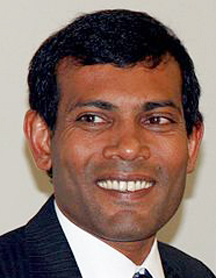MALE, (Reuters) – President Mohamed Nasheed of the Maldives, widely credited with bringing democracy to the Indian Ocean archipelago, resigned yesterday after weeks of opposition protests erupted into a police mutiny and what an aide said amounted to a coup.

Nasheed, the Sunni Muslim nations’ first democratically elected president , handed power to Vice-President Mohamed Waheed Hassan Manik, and said that continuing in office would result in his having to use force against the people.
Protests last year over the faltering economy and scrambling ahead of this year’s presidential election, have seen parties adopting hardline Islamist rhetoric and accusing Nasheed of being anti-Islamic.
“I resign because I am not a person who wishes to rule with the use of power,” he said in a televised address. “I believe that if the government were to remain in power it would require the use of force which would harm many citizens.
“I resign because I believe that if the government continues to stay in power, it is very likely that we may face foreign influences.”
It was not immediately clear to what influences he was referring but Hassan Saeed, leader of the DQP – a party in the opposition coalition, and an Indian diplomatic source in Colombo said Nasheed had asked India for help and been refused.
India helped foil a coup on the islands in 1988 by sending a battalion of soldiers to back the government.
A spokesman for India’s Foreign Ministry, Syed Akbaruddin, said the rebellion was an internal matter for the Maldives “to be resolved by the Maldives”.
Late yesterday, tourists and air traffic were moving without disruption in and out of the islands’ main airport.
Britain’s Foreign Office said a team of diplomats was on its way to the Maldives and that London viewed developments “with concern” and called on all groups “to find a peaceful way through these difficulties, in accordance with the Constitution”.
DEMOCRACY
Nasheed swept to victory in 2008, pledging to bring full democracy to the low-lying islands and speaking out passionately on the dangers of climate change and rising sea levels.
But he drew opposition fire for his arrest of a judge he accused of being in the pocket of his predecessor, Maumoon Abdul Gayoom, who ruled for 30 years.
Protests at the arrest set off a constitutional crisis that had Nasheed – jailed in all for six years and arrested 27 times by Gayoom’s government while agitating for democracy – defending himself against accusations of acting like a dictator.
“It’s a coup, I am afraid,” an official at Nasheed’s office said, asking not to be identified. “The police and Gayoom’s people as well as some elements in the military have forced the president Nasheed to resign. According to my book it’s a coup.”




